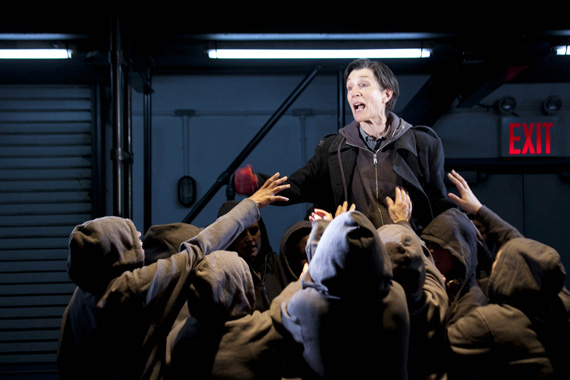Julius Caesar

(© Pavel Antonov)
St. Ann's Warehouse has been transformed into a women's correctional facility. We the audience/inmates are made to shuffle up a narrow staircase into the house as the guards look on stoically. An automated garage door closes behind us, eliminating the ability to escape from the theater for 135 uninterrupted minutes (the length of 1.5 episodes of Orange Is the New Black). This dehumanizing restriction of movement perfectly establishes the atmosphere of control in William Shakespeare’s Julius Caesar, which has been brilliantly reimagined at St. Ann’s by director Phyllida Lloyd. This all-female Caesar is making its New York debut after premiering at London’s Donmar Warehouse last November. It’s an action-packed, sharp rendition that reveals how chaos thrives even in the seemingly most oppressive of places.
Even within this stifling environment of egalitarian repression, hierarchies emerge, alliances form, and the dogs of war are let slip. These women live by the laws of the jungle, where only the strongest survive. Appropriately, Bunny Christie’s set is a literal jungle gym of a common room, from which endlessly inventive props and costumes spring. Red cleaning gloves become blood-soaked hands. Donuts are coveted like drachma. A paper Burger King crown becomes the symbol of monarchy so desired and despised. At every turn, Lloyd imaginatively ties the unruly world of the prison to an unraveling Rome.
Triumphantly returned to Rome, Caesar (Frances Barber) is greeted with a punk karaoke version of Jackie DeShannon’s "When You Walk in the Room" from Mark Antony (Cush Jumbo) and her fellow prisoners. Fearing that Caesar's popularity imperils the Republic, Senator Cassius (Jenny Jules) beseeches Senator Brutus (Harriet Walter) to plot murder against this incipient tyrant. A childlike soothsayer (Carrie Rock) warns Caesar to beware the Ides of March, but she attends the Senate that day, anyway; her lust for glory proves too tempting when she learns from Casca (Susan Brown) that the Senators are planning to offer her crown. The conspirators murder Caesar and expect to be hailed as preservers of the Republic. Instead, their plot backfires when Caesar loyalist Antony reads aloud from Caesar's will at a public memorial. Civil war ensues, pitting these guileless republicans against the triumvirate heirs of Caesar.
This production, from director Lloyd (Broadway’s recent Donmar transfer of Mary Stuart, which also starred Walter), emphasizes the force of personality over the public imagination, a power that far surpasses that of institutions. The judicious use of live video, projected large on the upstage wall in multiple places, speaks to how mass media has only aided the cult of personality. As Caesar lay dying, the video feed flickers in an out, finally extinguishing with her death. How could ordinary Romans ever appreciate the need to preserve a system that has only ever served the elite, when Caesar delivered actual results for the common man? What is this republic but an antiseptic prison, held up by inexplicable tradition and a false notion of justice? No matter what a terrible bully she is (Barber’s Caesar is particularly mean), one gets the sense that the alternative infighting and bloodshed will be much worse.
The violence is thrillingly conventionalized by surging metal music and bombastic percussion. That is, until it becomes frighteningly real violence (masterfully choreographed by Kate Waters): We are never allowed to forget that these are inmates performing the play, with their own drama boiling just under the surface.
The actors thrive in these dual roles. Walter maintains a quiet dignity throughout, even when she’s spouting expletives at her fellow prisoners as they giggle behind a curtain during her tent scene with Cassius. Walter’s staid patrician accent perfectly gives voice to the honorable yet hopelessly out-of-touch Brutus. The handsome Jumbo has unearthed a tremendous amount of vulnerability as Antony, giving a dramatic arc to her "Friends, Romans, Countrymen" speech that feels unexpected, even for those well familiar with the play.
It is impossible to walk away from this production without new insights into the original text, which feels as relevant, prescient, and alive as ever. You can learn more about the true nature of political power from Shakespeare and two hours in a women’s prison than you can from reading any textbook or treatise.











